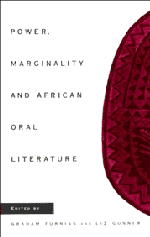Book contents
- Frontmatter
- Contents
- List of contributors
- Preface
- Note on transcription
- 1 Introduction: power, marginality and oral literature
- Part I Orality and the power of the state
- 2 Oral art and contemporary cultural nationalism
- 3 The letter and the law: the politics of orality and literacy in the chiefdoms of the northern Transvaal
- 4 A king is not above insult: the politics of good governance in Nzema avudwene festival songs
- Part II Representing power relations
- Part III Oral forms and the dynamics of power
- Part IV Endorsing or subverting the paradigms: women and oral forms
- Part V Mediators and communicative strategies
- Bibliography
- Index
3 - The letter and the law: the politics of orality and literacy in the chiefdoms of the northern Transvaal
Published online by Cambridge University Press: 18 December 2009
- Frontmatter
- Contents
- List of contributors
- Preface
- Note on transcription
- 1 Introduction: power, marginality and oral literature
- Part I Orality and the power of the state
- 2 Oral art and contemporary cultural nationalism
- 3 The letter and the law: the politics of orality and literacy in the chiefdoms of the northern Transvaal
- 4 A king is not above insult: the politics of good governance in Nzema avudwene festival songs
- Part II Representing power relations
- Part III Oral forms and the dynamics of power
- Part IV Endorsing or subverting the paradigms: women and oral forms
- Part V Mediators and communicative strategies
- Bibliography
- Index
Summary
In 1923 the Native Commissioner of Potgietersrus, who was involved in an ongoing feud with Chief Alfred Masibi of Zebediela, wrote to his adversary. ‘I do not as a rule,’ he said, ‘take verbal messages — you must get your secretary to write when transacting government business.’ A few years later a new chief, Abel Kekana, took office, but in no time the Native Commissioner was at loggerheads with him too. In May 1929 the Native Commissioner wrote to the Secretary for Native Affairs complaining about Kekana's behaviour:
Adverting to my minute No. 2/1 of the 19th ult., and with reference to your No. 27/55 of the 6th inst. in connection with the conduct of the above named chief, I have the honour to submit [a] copy of my letter evenly numbered of the 8th inst. addressed to this chief calling upon him for an explanation as directed by you. To this letter no response was received other than an intimation that he was busy with his circumcision school and would attend to the matter later. On the 16th inst. I attended the Local Council meeting at Zebediela, and there saw the young chief to whom I at once intimated that I was not there to receive his explanation which he could either submit in writing or personally at my office at Potgietersrust. [...]
- Type
- Chapter
- Information
- Power, Marginality and African Oral Literature , pp. 35 - 46Publisher: Cambridge University PressPrint publication year: 1995
- 1
- Cited by



